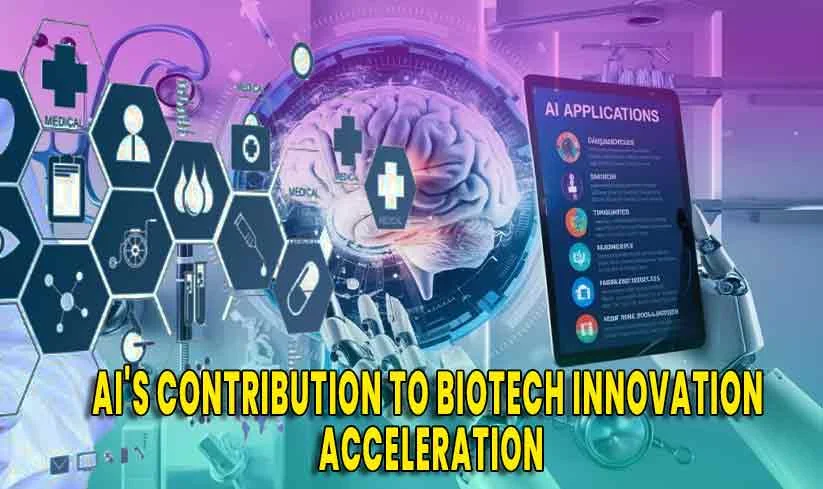AI's Contribution to Biotech Innovation Acceleration
The biotechnology sector is experiencing a significant transformation, largely fueled by rapid advancements in artificial intelligence (AI). AI is propelling innovation in biotechnology by streamlining drug discovery, enhancing clinical trial processes, refining diagnostics, and facilitating personalized medicine. Its capacity to analyze extensive datasets, forecast outcomes, and automate intricate procedures is not only reducing the time and expenses linked to biotech research but also improving accuracy and efficiency.
This article examines the ways in which AI is transforming biotechnology, the critical areas of impact, and the future potential of AI-driven advancements in the field.
1. AI in Drug Discovery and Development
1.1 Speeding Up Drug Target Identification
Identifying suitable biological targets is one of the most labor-intensive stages of drug development. AI-enhanced algorithms can scrutinize genomic, proteomic, and metabolomic data to accurately identify potential drug targets, surpassing the effectiveness of conventional methods. Machine learning models can forecast the interactions of various molecules with biological systems, significantly expediting the early phases of drug discovery.
1.2 AI in Molecular Design and Virtual Screening
AI-based platforms such as AlphaFold, created by DeepMind, and Schrödinger’s computational chemistry tools are transforming molecular design. These technologies can predict protein structures and simulate drug interactions, enabling researchers to evaluate thousands of compounds virtually before conducting laboratory experiments. This approach minimizes the reliance on expensive and time-consuming trial-and-error methods.
1.3 Repurposing Existing Drugs
AI has the capability to assess current medications and forecast new therapeutic applications, a strategy known as drug repurposing. For instance, during the COVID-19 pandemic, AI was instrumental in identifying several existing drugs that could potentially be effective against the virus, thereby accelerating the development of emergency treatments.
2. AI in Optimizing Clinical Trials
2.1 Recruitment and Patient Stratification
Clinical trials frequently encounter delays stemming from challenges in finding appropriate participants. Artificial intelligence can evaluate electronic health records (EHRs), genetic information, and lifestyle variables to pinpoint the most suitable candidates for trials. This approach facilitates quicker enrollment and enhances the likelihood of trial success by selecting patients who are more likely to benefit from the treatment.
2.2 Predictive Analytics for Success in Trials
AI models are capable of predicting potential risks and outcomes in clinical trials by examining historical data from previous trials. This allows researchers to modify protocols in real-time, thereby decreasing failure rates and increasing overall efficiency.
2.3 Real-Time Monitoring and Adaptive Trial Designs
The use of wearable technology combined with AI-driven analytics allows for the continuous monitoring of trial participants. AI can identify adverse reactions at an early stage, recommend adjustments to dosages, and propose changes to trial protocols, thereby making trials more flexible and focused on patient needs.
3. AI in Diagnostics and Precision Medicine
3.1 Early Detection of Diseases
AI is significantly improving diagnostic precision in areas such as oncology, neurology, and cardiology. For instance:
AI in Radiology: Advanced deep learning algorithms can accurately identify tumors, fractures, and other irregularities in medical imaging.
AI in Pathology: Specialized algorithms assess tissue samples to classify cancer subtypes and forecast disease progression.
3.2 Genomic Medicine and Tailored Treatments
AI accelerates the process of genomic analysis, paving the way for precision medicine, where treatments are customized based on an individual’s genetic profile. Organizations like 23andMe and Illumina leverage AI to interpret genetic information, assisting healthcare providers in prescribing personalized therapies for conditions such as cancer and rare genetic disorders.
3.3 AI-Enhanced Wearables and Remote Diagnostics
Health monitoring devices equipped with AI can track vital signs, identify anomalies, and notify both users and healthcare professionals of potential health concerns before symptoms manifest. This capability is especially beneficial for managing chronic diseases and implementing preventive care strategies.
4. AI in Biomanufacturing and Synthetic Biology
4.1 Enhancing Bioproduction Processes
Artificial intelligence enhances biomanufacturing by fine-tuning fermentation parameters, forecasting yields, and minimizing waste. This optimization is vital for the production of biologics, vaccines, and lab-cultivated meat.
4.2 AI in Synthetic Biology
Synthetic biology focuses on creating novel biological systems for uses such as biofuels, biodegradable materials, and engineered microorganisms. AI contributes by simulating genetic circuits, forecasting the outcomes of gene editing (such as CRISPR effectiveness), and expediting the design-build-test process.
5. Challenges and Ethical Considerations
Despite the significant advantages AI presents, several challenges persist:
- Data Privacy: The management of sensitive genetic and health information necessitates stringent regulations.
- Bias in AI Models: If the training data lacks representativeness, AI may yield biased outcomes, which can impact diagnostic accuracy and treatment suggestions.
- Regulatory Challenges: Innovations in biotech driven by AI must adhere to the continuously evolving guidelines set by the FDA and EMA.
6. The Future of AI in Biotechnology
The integration of AI and biotechnology is expected to result in:
- Accelerated and Cost-Effective Drug Development: AI has the potential to shorten drug discovery timelines from a decade to just a few years.
- AI-Engineered Therapeutics: Drugs developed entirely through AI may soon progress to clinical trials.
- AI-Enhanced Gene Editing: The combination of CRISPR and AI could facilitate precise genetic therapies for hereditary conditions.
- Decentralized Clinical Trials: The use of AI and blockchain technology may enable global, virtual clinical trials.
Conclusion
Artificial intelligence is transforming the biotechnology sector by significantly enhancing innovation in areas such as drug discovery, diagnostics, clinical trials, and biomanufacturing. Despite ongoing challenges related to data privacy and regulatory compliance, the advantages—such as personalized medicine, expedited cures, and sustainable biotechnological solutions—are substantial. As AI technology progresses, its influence in biotechnology is expected to grow, leading to a new era of medical and scientific advancements.
By integrating AI into their processes, the biotechnology industry can achieve remarkable efficiency, enabling the delivery of life-saving treatments to patients more swiftly than ever. The future of biotechnology is characterized by intelligence, data-driven insights, and is set for groundbreaking developments, all made possible by AI.






